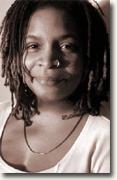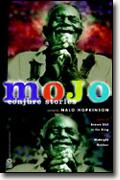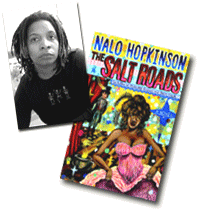An Interview with
Nalo Hopkinson
Interviewer Luan
Gaines: I haven’t read much fantasy or fabulist literature, but found The Salt Roads instantly fascinating. Do you think this new novel has broader audience appeal, considering some of the material?
Nalo Hopkinson:
I'm glad that you liked it. Yes, I do think that it has wider appeal, and my editor thought so too. That's why The Salt Roads is being published as a mainstream release, not a genre novel.
You have used a unique premise in The Salt Roads, the birth of a goddess and her continuing evolution. Does fabulist storytelling allow you the freedom to explore your ideas more fully?
For me, it does, because it allows me to entertain possibilities outside our current consensus reality. Yet all fiction is essentially fantastical, so I wouldn't say that realistic fiction is at all limiting. It's just not the form that most holds my interest.
How did you choose the three women inhabited by the Goddess Ezili?
Like many of the Haitian lwas (African deities), Ezili has many forms. Three of them are Ezili Frèda, Ezili Danto and Ezili Je-Wouj (Red-eyed Ezili). Each form has different aspects. The three women each reflect those various aspects. It was a lovely coincidence that I had long wanted to write about Jeanne Duval and about Gypsy Mary, and that they so closely fit the attributes of two of the Ezilis. I invented the character of Mer to fit the third.
 Jeanne Duval is an interesting character, caught in a society that values beauty yet discriminates against color. Is Jeanne an example of such a woman’s struggle in an era of particularly male-dominated society, Paris in 1842?
Jeanne Duval is an interesting character, caught in a society that values beauty yet discriminates against color. Is Jeanne an example of such a woman’s struggle in an era of particularly male-dominated society, Paris in 1842?
I honestly don't know. Jeanne is so unique. And yet, everywhere we've had the "peculiar institution" of Europeans enslaving black Africans, it has created systemic race-based oppression that's outlasting the actual institution of slavery. Couple that with gender-based oppression, and you have a story very familiar to many women of colour.
One of the most heartrending portraits is the slave woman, Mer. Does she portray the plight of slaves taken from Africa on the slave ships? Or is there a broader perspective?
No, I don't create my characters by deciding that so-and-so will be typical of such-and-such an experience. That would be stereotypical, offensive and deadly dull. I try to make them as quirky as real people would be, living under those same conditions.
Meritet is the smallest role of the women touched by the goddess. Yet she is a fascinating subject. What prompted Meritet’s creation?
She's someone who may or may not have existed. She's one of the few Catholic saints who is African, so she's interested me as long as I've known about her. The story about her goes that she loved sex so much that she became a prostitute as a teenager. I wanted to throw that characterisation into question. No-one becomes a prostitute because they love sex. They do it because they need a job.
For the most part, your women are earthy, sensual and real. Do you see this as their true nature, especially women of color?
Again, women of colour are people, not stereotypes. I can't make any useful generalizations about all women, all women of colour, or even all black women ("black" is not the same thing as "of colour," which means any racial background except white, and includes Asian, South Asian, and Native peoples). Ezili is a very sensual deity, so I created characters that would play out some of that.
A couple of times, well, a few, you made me blush. How are you able to access this wonderful sexual openness when writing?
I'm glad that you enjoyed it. If you can conceive of something, you can write it down. It isn't always easy, but it is that simple.




